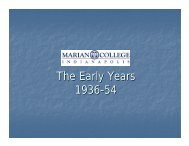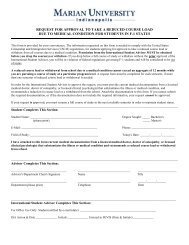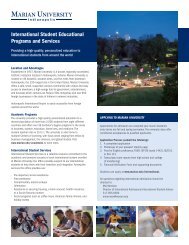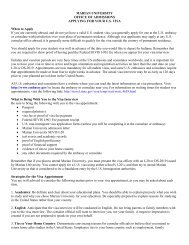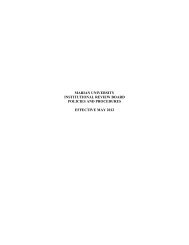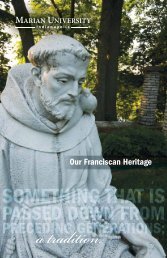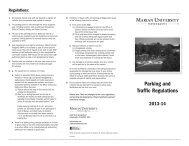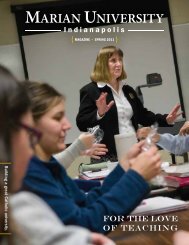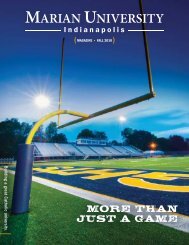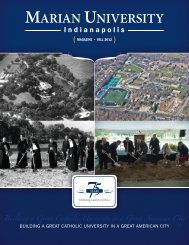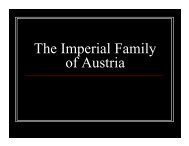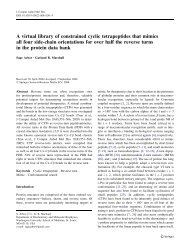2009-11 Marian University Course Catalog, fall 2010 edition
2009-11 Marian University Course Catalog, fall 2010 edition
2009-11 Marian University Course Catalog, fall 2010 edition
You also want an ePaper? Increase the reach of your titles
YUMPU automatically turns print PDFs into web optimized ePapers that Google loves.
For more information on this program, contact the director of<br />
CSEPP 317.955.6089.<br />
Project Bridge:<br />
Master of Arts in Teaching Program<br />
The Master of Arts in Teaching (M.A.T.) graduate program is<br />
fully accredited by the Division of Professional Standards and<br />
has been approved by the Higher Learning Commission. The<br />
teacher education program is also NCATE accredited.<br />
Individuals who are interested in applying to this graduate<br />
program should contact the School of Education or the M.A.T.<br />
director for information.<br />
The program is a Transition to Teaching program that<br />
provides post-baccalaureate individuals with a pathway to<br />
become licensed elementary teachers in Indiana. Completion<br />
of the program leads to licensure for primary and<br />
intermediate grades in elementary schools.<br />
Participants are organized in cohorts that complete extensive<br />
internship experiences with trained mentors in schools.<br />
M.A.T. cohorts begin the program in June and complete it in<br />
one or two years based on program and credit enrollment.<br />
Enrollment in M.A.T. courses is limited to cohort members<br />
only.<br />
The M.A.T. program incorporates <strong>Marian</strong> <strong>University</strong>’s<br />
Franciscan Catholic sponsorship values of dignity of the<br />
individual, reconciliation, responsible stewardship, and peace<br />
and justice as the moral imperatives for teaching and<br />
learning.<br />
The elementary education level M.A.T. program includes a<br />
concentration in second language learning to ensure that its<br />
graduates have critical knowledge and skills necessary to<br />
meet the needs of all learners. Students in this M.A.T.<br />
program prepare to be mainstream classroom teachers, while<br />
also learning how to best teach children whose native<br />
language is not English. The program includes a strong<br />
emphasis on cultural and linguistic diversity in today’s<br />
classrooms. Enrolled students may select the transition-toteach<br />
option after consultation with the program director.<br />
Admission<br />
Admission to the M.A.T. program is selective.<br />
Program Assessment<br />
Students in the M.A.T. program must successfully complete<br />
three assessments to fulfill program requirements. For<br />
retention in the M.A.T. program, graduate students must<br />
earn and maintain a 3.00 cumulative GPA. Students must also<br />
meet other performance expectations as cited in the Master<br />
of Arts in Teaching Handbook available in the School of<br />
Education office.<br />
Admission to M.A.T. Program/<br />
Phase 1 Assessment<br />
1. Selection criteria include previous academic record and<br />
degree, successful completion of PRAXIS I tests,<br />
criminal history check, work history, experiences<br />
working with children and adults, reflections on life<br />
and learning experiences, and statement of<br />
professional goals. Previous graduate and<br />
undergraduate transcripts are reviewed to evaluate<br />
background content in English, mathematics, science,<br />
and history.<br />
2. Highly qualified candidates are asked to participate in a<br />
personal interview with an M.A.T. admissions<br />
committee.<br />
3. Interviewed candidates must write an<br />
on-site essay.<br />
4. All application materials are evaluated and highly<br />
qualified candidates are invited to join the program.<br />
Formative Evaluation/Phase 2 Assessment<br />
1. Students document their knowledge, skills, and<br />
dispositions through a portfolio that reflects key<br />
course assignments and teaching experiences.<br />
2. Students must successfully complete Blocks 1 and 2<br />
coursework and internships.<br />
3. Students continue to refine the<br />
intern portfolio.<br />
4. Students complete a mid-program interview.<br />
Program Completion/Phase 3 Assessment<br />
1. Intern portfolio is completed.<br />
2. Students must successfully complete coursework and<br />
Block 3 internship.<br />
3. Students must successfully complete PRAXIS II tests.<br />
4. Students must participate in the<br />
research seminar.<br />
M.A.T. Requirements: 36 credits including a core of 505,<br />
514, 515, 516, 520, 590, 591, 7 credits of 560 and 12<br />
additional hours as specified. The elementary program<br />
requires 521, 522, 523, 525, 530, and 531. The exceptional<br />
needs program requires 519, 533, 538, and 549. The<br />
secondary program requires 519, 523, 525, 530, 531 and one<br />
of 521, 522, or 527.<br />
EXERCISE AND SPORT STUDIES (ESS)<br />
Major for Bachelor Degree (B.S.) in Sport Performance: The<br />
Sport Performance major is comprised of 40 hours including<br />
the departmental core course of 128, 230, 410, 490, and BIO<br />
225. Additional requirements include 120, 270, 340, 370, 375,<br />
435, 451, and 452. ESS 360 Internship in ESS is strongly<br />
encouraged. Additional courses in Biology, Chemistry and<br />
Statistics are also encouraged. The student must maintain a<br />
GPA of 2.6 or better in the above courses.<br />
57



